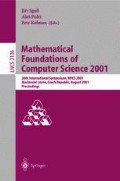Abstract
This paper contains answers to several problems in the theory of the computational complexity of infinite words. We show that the problem whether all infinite words generated by iterating dgsm’s have logarithmic space complexity is equivalent to the open problem asking whether the unary classes of languages in P and in DLOG are equivalent. Similarly, the problem to find a concrete infinite word which cannot be generated in logarithmic space is equivalent to the problem to find a concrete language which does not belong to DSPACE(n). Finally, we separate classes of infinite words generated by double and triple D0L TAG systems.
Research supported by DAAD and Academy of Finland under a common grant No. 864524.
Access this chapter
Tax calculation will be finalised at checkout
Purchases are for personal use only
Preview
Unable to display preview. Download preview PDF.
References
Hromkovič, J., Karhumäki, J., Two lower bounds on computational complexity of infinite words, New trends in formal languages, LNCS 1218, 366–376, 1997.
Hromkovič, J., Karhumäki, J., Lepistö, A., Comparing descriptional and computational complexity of infinite words, Results and trends in theoretical computer science, LNCS 812, 169–182, 1994.
Culik, K., II, Karhumäki, J., Iterative devices generating infinite words, Int. J. Found. Comput. Sci., Vol. 5 No. 1, 69–97, 1994.
Lepistö, A., On the computational complexity of infinite words, In: Developments in Language Theory II (eds.: J. Dassow, G. Rozenberg, A. Salomaa), World-Scientific, Singapore, 350–359, 1996.
Kolmogorov, A. N., Three approaches to the quantitative definition of information, Problems Inform. Transmission 1, 662–664, 1968.
Lothaire, M., Combinatorics on words, Addison-Wesley, Reading, Massachusetts, 1981.
Thue, A., Über unendliche Zeichenreihen, Norske Vid. Selsk. Skr., I Mat. Nat. KI., Kristiania 7, 1–22, 1906.
Author information
Authors and Affiliations
Editor information
Editors and Affiliations
Rights and permissions
Copyright information
© 2001 Springer-Verlag Berlin Heidelberg
About this paper
Cite this paper
Ďuriš, P., Maňuch, J. (2001). On the Computational Complexity of Infinite Words. In: Sgall, J., Pultr, A., Kolman, P. (eds) Mathematical Foundations of Computer Science 2001. MFCS 2001. Lecture Notes in Computer Science, vol 2136. Springer, Berlin, Heidelberg. https://doi.org/10.1007/3-540-44683-4_29
Download citation
DOI: https://doi.org/10.1007/3-540-44683-4_29
Published:
Publisher Name: Springer, Berlin, Heidelberg
Print ISBN: 978-3-540-42496-3
Online ISBN: 978-3-540-44683-5
eBook Packages: Springer Book Archive

